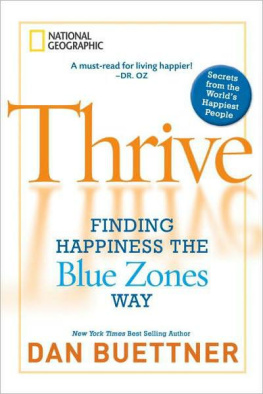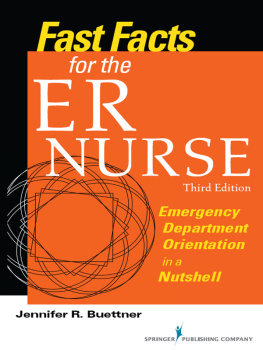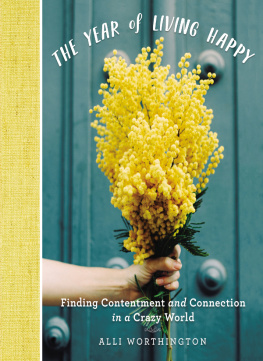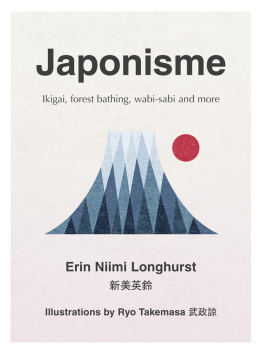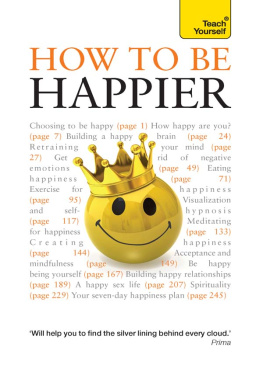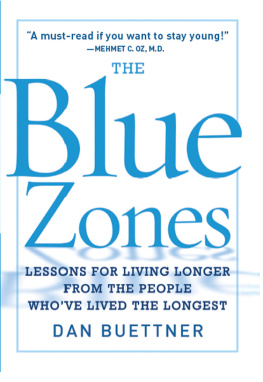Thrive
Finding Happiness the Blue Zones Way
Dan Buettner

Published by the National Geographic Society
Copyright 2010 Dan Buettner. All rights reserved. Reproduction of the whole or any part of the contents without written permission from the publisher is strictly prohibited.
ISBN: 978-1-4262-0670-2
Photo credits for , David McLain/Aurora Photos

The National Geographic Society is one of the worlds largest nonprofit scientific and educational organizations. Founded in 1888 to increase and diffuse geographic knowledge, the Society works to inspire people to care about the planet. National Geographic reflects the world through its magazines, television programs, films, music and radio, books, DVDs, maps, exhibitions, live events, school publishing programs, interactive media and merchandise. National Geographic magazine, the Societys official journal, published in English and 32 locallanguage editions, is read by more than 35 million people each month. The National Geographic Channel reaches 320 million households in 34 languages in 166 countries. National Geographic Digital Media receives more than 13 million visitors a month. National Geographic has funded more than 9,200 scientific research, conservation and exploration projects and supports an education program promoting geography literacy. For more information, visit nationalgeographic.com .
For more information, please call 1-800-NGS LINE (647-5463) or write to the following address:
National Geographic Society
1145 17th Street N.W.
Washington, DC 20036-4688 U.S.A.
www.nationalgeographic.com
For rights or permissions inquiries, please contact National Geographic Books Subsidiary Rights: ngbookrights@ngs.org
10/WCPF/1
To Spanky, Irene, and Rafa, who, despite research that might suggest otherwise, are a fathers greatest source of happiness.
A M ESSAGE TO THE R EADER
This publication contains the opinions and ideas of its author. It is intended to provide helpful and informative material on the subjects addressed in the publication. It is sold with the understanding that the author and publisher are not engaged in rendering medical, health, or any other kind of personal professional services in the book. The reader should consult his or her medical, health, or other competent professional before adopting any of the suggestions in this book or drawing inferences from it.
The author and publisher specifically disclaim all responsibility for any liability, loss, or risk, personal or otherwise, which is incurred as a consequence, directly or indirectly, of the use and application of any of the contents in this book.
C ONTENTS
PREFACE
Searching for Happiness
CHAPTER ONE
The Truth About Happiness
CHAPTER TWO
Denmark
The Worlds Happiness All-Stars
CHAPTER THREE
Singapore
Can You Manufacture a Happy Nation?
CHAPTER FOUR
Mexico
The Secret Sauce of Happiness
CHAPTER FIVE
San Luis Obispo
A Real American Dream
CHAPTER SIX
Lessons in Thriving
SPECIAL BONUS CHAPTER
The Truth About Living Longer

Even after she turned 100, Francesca Castillo, called Panchita by her friends, kept cutting her own wood at her home on the Nicoya Peninsula in Costa Rica, reflecting a positive energy and happy outlook. P HOTO BY G IANLUCA C OLLA
PREFACE
Searching for Happiness
Its ten oclock on a Sunday morning in Hojancha, a small town in rural Costa Rica, and Im on a mission. A few years ago, I met a woman here, the daughter of a Cuban revolutionary, who raised four children by herself on the edge of the jungle. Her name was Panchita, and when I first got to know her she had just celebrated her 99th birthday. Wearing a colorful dress, carnival beads, and hooped earrings, she would sit on a wooden plank on the patio of her tin-roofed house, dangle her legs above the dirt floor, and tell stories with friends and relatives who came to visit. She punctuated her conversations with a gentle touch and, depending on the topic, a sympathetic sigh or a whooping laugh. At sunset, once her guests had departed, she would make herself a simple meal of beans and handmade tortillas, say her prayers, and go to bed.
Recently I heard that Panchita had a medical setback and moved out of her farmhouse into a one-room shack behind her sons place. Im on my way to see her now.
A modest community of cinder-block houses, shops, and stables, Hojancha is populated mainly by farmers and sabaneros, the leathery-tough cowboys of Central America. Set apart from the rest of Costa Rica on the Nicoya Peninsula, people here have been left to themselves to follow the rhythms of their Mesoamerican ancestors. Something about their lifestyleperhaps the lime-soaked corn tortillas called nixta-male, the wildly exotic fruits they grow in their gardens, the off-the-charts levels of calcium and magnesium in their tap water, their ability to shed stress with laughter and conversation, or even their penchant for extramarital sexhas given people in this region the extraordinary gift of long life. In fact, the Nicoya Peninsula represents one of the most impressive pockets of longevity in the entire Western Hemispherea Blue Zone, as Ive come to call such places. For the past eight years Ive been studying the worlds longevity Blue Zones. Ive met more than 250 centenarians on five continents, some of whom still work as lawyers, stand on their heads, climb trees, or compete in karate matches.
Yet few have charmed me like Panchita.
When I arrive at her shack on this Sunday morning, the place is packed. A priest has come to say Catholic Mass, and others have stopped by to socialize, including middle-aged women from town, an 80-year-old cowboy, and a boy who used to corral Panchitas chickens for her when she lived alone. Sitting upright on her bed, she looks up at me through milky-rimmed pupils and, in a flash of recognition, yelps, Hola, Papi! She wraps me in a bony embrace and holds on. As I hug her back, feeling her warm, birdlike body, I realize that when this body was born, Mark Twain was still writing fiction, and construction had not yet begun on the Titanic . Positively beaming, she pulls me down next to her. See, God has blessed me! she brags to her guests. El Gringo has come to visit me. And Im thinking: Heres a 103-year-old woman who has no money and no real possessions, is living in a borrowed house, is half paralyzed and mostly blind, and she feels blessed that Ive shown up? How is that possible?
LEARNING FROM THE EXPERTS
Its an eye-opening experience. During my years of studying longevity, Ive visited Blue Zones in Sardinia; Okinawa; Loma Linda, California; the Greek island of Ikara; and the Nicoya Peninsulaall places where people tend to suffer lower rates of heart disease and cancer than the rest of us and live up to a decade longer. Now Im wondering if there might also be pockets of people like Panchita who hold the secrets to a happier life. Are there places around the globe that nurture happiness in the same way that the Blue Zones nurture longevity? If there are, what can we learn from these places to increase our own happiness in the same way that weve learned lessons about long life from the worlds centenarians?

